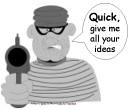| Nothing less than the future of Western literature is at stake in the High Court tomorrow. Or so the publisher of The Da Vinci Code, the money-spinning blockbuster by Dan Brown, is expected to argue in a ground-breaking trial.Brown, whose tale of clerical conspiracy and murder has become the bestselling hardback adult novel of all time, is accused of plundering his plot from a non-fiction work called The Holy Blood and the Holy GrailHistorians Michael Baigent and Richard Leigh, who co-wrote the book with Henry Lincoln, claim that Brown plagiarised 'the whole jigsaw puzzle' of their decade's worth of research - that Jesus married Mary Magdalene and had a child, founding a bloodline that was protected by the Knights Templar.If they win, the historians will seek an injunction preventing further infringement of their copyright. In theory, this could bar Random House from publishing Brown's book, which has sold more than 40 million copies, and even threaten the British release of the �53m film adaptation, starring Tom Hanks, Audrey Tautou and Sir Ian McKellen.However, lawyers representing Random House are expected to argue that the implications would damage the art of writing itself.It is believed they will tell the court that for centuries writers have recycled plots, themes and ideas from each other. One literary figure has pointed out that apart from A Midsummer Night's Dream, every one of Shakespeare's plays is based on another source. Such trading has given rise to the saying, 'good writers borrow, great writers steal'." |
 The (Art) Thief
The (Art) Thief
